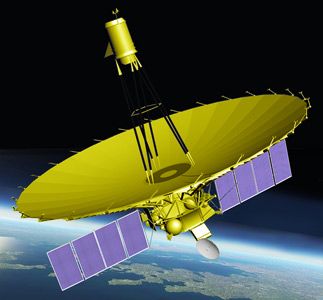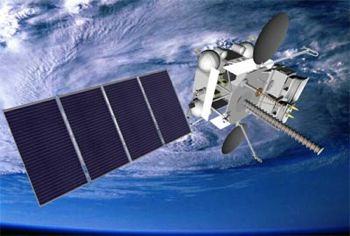
Home - Search - Browse - Alphabetic Index: 0- 1- 2- 3- 4- 5- 6- 7- 8- 9
A- B- C- D- E- F- G- H- I- J- K- L- M- N- O- P- Q- R- S- T- U- V- W- X- Y- Z
Navigator bus
 Spektr R Credit: Manufacturer Image |
Status: Operational 2011. First Launch: 2011-01-20. Last Launch: 2011-07-18. Number: 2 .
| Elektro-L 1, 2, 3 Meteorology satellite built by Lavochkin, Russia. Launched 2011 - 2015. Used Navigator-Bus. |
| Spektr R (Radio-Astron) Null |
| Arktika-M 1, 2 Meteorology, emergency communications satellite built by Lavochkin, Russia. Used Navigator-Bus. |
| Spektr-RG (SXG) Null |
| Spektr-UF (SUV, World Space Observatory Ultraviolet, WSO-UV) Null |
Family: Astronomy, Earth. Launch Vehicles: Zenit-3SLBF. Launch Sites: Baikonur LC45/1. Agency: Lavochkin bureau. Bibliography: 12873, 12874.
 | Elektro-L Credit: Manufacturer Image |
2011 January 20 - . 12:29 GMT - . Launch Site: Baikonur. Launch Complex: Baikonur LC45/1. LV Family: Zenit. Launch Vehicle: Zenit-3SLBF.
- Elektro-L - . Mass: 1,700 kg (3,700 lb). Nation: Russia. Class: Earth. Type: Weather satellite. Spacecraft: Navigator bus. USAF Sat Cat: 37344 . COSPAR: 2011-001A. Apogee: 35,796 km (22,242 mi). Perigee: 35,285 km (21,925 mi). Inclination: 0.40 deg. Period: 1,423.50 min. First launch of a new generation Russian geosynchronous weather satellite using the Lavochkin Navigator bus. Equipped with a scanning visible/infrared radiometer, solar environment monitor, and a COSPAS-SARSAT search-and-rescue transponder system..
2011 July 18 - . 02:31 GMT - . Launch Site: Baikonur. Launch Complex: Baikonur LC45/1. LV Family: Zenit. Launch Vehicle: Zenit-3SLBF.
- Spektr R - . Mass: 3,660 kg (8,060 lb). Nation: Russia. Class: Astronomy. Type: Radio astronomy satellite.. Spacecraft: Navigator bus. USAF Sat Cat: 37755 . COSPAR: 2011-037A. Apogee: 303,108 km (188,342 mi). Perigee: 27,499 km (17,087 mi). Inclination: 58.45 deg. Period: 11,799.00 min. Russian astronomical space observatory. Carried 10m diameter radio telescope observing at 92, 18, 6 and 1.35 cm wavelengths; solar wind and cosmic dust detectors; and laser corner reflectors for tracking..
Back to top of page
Home - Search - Browse - Alphabetic Index: 0- 1- 2- 3- 4- 5- 6- 7- 8- 9
A- B- C- D- E- F- G- H- I- J- K- L- M- N- O- P- Q- R- S- T- U- V- W- X- Y- Z
© 1997-2019 Mark Wade - Contact
© / Conditions for Use